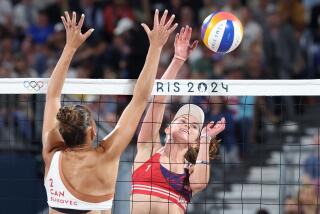Trouble in Paradise
- Share via
Pro beach volleyball was once the coolest, hippest sport of the 1990s. It gave us the trendiest sunglasses, the most colorful hats and the sexiest heartthrobs. What’s gone wrong?
Four years ago, there were 17 beach volleyball telecasts on NBC. This year, there are none. The purses on the Assn. of Volleyball Professionals tour once totaled more than $4 million. This year, they have dropped to less than $1.2 million.
The Women’s Pro Beach Volleyball tour has entered into “voluntary dissolution.” The four-on-four men’s and women’s team tours have vanished.
“I think the sport is in trouble,” said Kent Steffes, who is among volleyball’s richest and most visible players. “I think things need to be done to save the sport.”
If television means everything for the viability of a professional sports league, beach volleyball has serious problems. Last year, there were seven men’s telecasts on NBC and five women’s events on ABC. This year, there are none. Last year, Fox Sports Net televised 18 men’s and eight women’s events. This year, there are 13 men’s and zero women’s events. Last year, ESPN televised 24 beach volleyball events. This year, there are seven.
“There’s no question sports and TV are intrinsically linked, and if you don’t have a good TV component, you’re not going to be successful in this day and age,” said Jon Stevenson, a former AVP president who runs the league’s tour events. “This is more a growing pain, transition stage.”
NBC had televised events on the AVP tour since 1990, but it dropped beach volleyball this year after Miller Brewing Co. decided to reallocate its television funding and pulled out as the primary sponsor.
“They [Miller] were the main advertiser on our coverage and a significant supporter of AVP on NBC,” network spokesman Ed Markey said. “It got to the point where it would not have been a good business decision to keep televising it this year.”
Bob Yalen, manager of ESPN programming, said he has had three different deals this year with beach volleyball organizers “go bankrupt or dissolve themselves.”
“Politically, it’s a tough animal,” Yalen said. “There’s a lot of personalities involved and pulling it all together under one umbrella is not an easy job.”
Steffes said he was threatened with being “kicked off the tour” because of comments he made in a San Diego Union-Tribune article last month in which he referred to the people running the sport as “totally incompetent.”
And he’s one of the few players still prospering on the beach tour. He and partner Jose Loiola have won four of the first seven tournaments this season on the Miller Lite/AVP Tour.
“I’ve never had more personal sponsors in my life,” he said. “I’m a rich guy.”
So why is he so angry?
“To say TV doesn’t matter is a joke,” he said. “It does matter. We get lost in a clutter of cable channels. I got 60 channels, my dad has 500. It’s crowded out there.”
Steffes said the sport remains popular. “The people still like it,” he said. “The fans cheer, but the business is being run horribly.”
Jerry Solomon, former AVP executive director, left by mutual agreement last December. He was replaced by Harry Usher, former chief operating officer for the 1984 Los Angeles Olympics.
Usher inherited a $2.4-million debt and a crisis situation.
“I had some doubts in my mind when I took this position,” he said. “It hasn’t been the [best] managed business I’ve seen, but the product is still terrific.”
Besides finding enough cash to run this year’s tour, Usher said his other major assignment is seeking an individual or corporate entity to take over the AVP.
“I think the AVP will, in all likelihood, be acquired by some entity, in whole or part,” he said. “The hooks are out there.”
If there are any takers, it will be up to the players to vote on their future.
“We can’t understand how we got to the position we are in,” said Adam Johnson, who earned $145,000 last year as one of the tour’s top players.
For now, the 22-event AVP tour goes on, with Miller Brewing Co. still a title sponsor and stops scheduled for July 10-12 at Seal Beach and Aug. 14-16 at Hermosa Beach. This year, AVP players agreed to slice their prize money in half to help deal with the debt. New event sponsors such as Sunkist have been brought aboard.
“The AVP is trying to put this sport on solid ground,” said Stevenson, who has been part of the AVP organization since its founding in 1983. “It took a hit, no question about it. But we’re still in business. Give us a chance to prove ourselves.”
Only two years ago, Steffes and Karch Kiraly gained worldwide attention for winning a gold medal in the first beach volleyball competition at the Olympic Games in Atlanta.
“After this tremendous world event in Atlanta, after it was the hottest ticket, it’s like, ‘Whoa,’ ” said John Kessel of USA Volleyball. “Clearly, we’re concerned. They [players and league officials] were not cooperating, and we’re concerned they’re struggling. I think it’s going to cause a shake-up, restructuring and unification of the beach groups.”
The various beach volleyball organizations have been known to feud like contestants in a World Wrestling Federation match. At one point, the AVP threatened not to allow players to compete in the Olympic Games in a disagreement with the FIVB, the sports’ governing body, over qualifying procedures.
Chris Marlowe, a beach volleyball commentator for ESPN and NBC, said what the sport needs is a “benevolent dictator” to bring all the factions together.
If beach volleyball supporters don’t solve their financial problems, players will likely have to turn to the indoor pro leagues in Europe or outdoor beach competitions on the international circuit.
Meanwhile, at least one top AVP player told friends he intends to get a full-time job to support his wife and family. He’s facing a new reality:
No longer can he afford being a full-time beach player.
More to Read
Go beyond the scoreboard
Get the latest on L.A.'s teams in the daily Sports Report newsletter.
You may occasionally receive promotional content from the Los Angeles Times.











